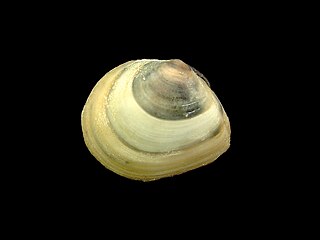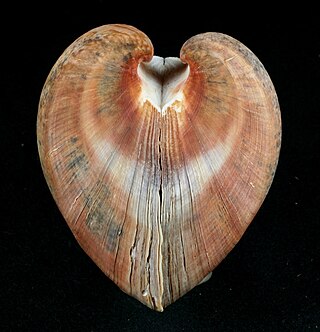Genus is a taxonomic rank used in the biological classification of living and fossil organisms as well as viruses. In the hierarchy of biological classification, genus comes above species and below family. In binomial nomenclature, the genus name forms the first part of the binomial species name for each species within the genus.

Murex is a genus of medium to large sized predatory tropical sea snails. These are carnivorous marine gastropod molluscs in the family Muricidae, commonly called "murexes" or "rock snails".

A salp or salpa is a barrel-shaped, planktonic tunicate in the family Salpidae. It moves by contracting, thereby pumping water through its gelatinous body, one of the most efficient examples of jet propulsion in the animal kingdom. The salp strains the pumped water through its internal feeding filters, feeding on phytoplankton.

Strombus is a genus of medium to large sea snails, marine gastropod molluscs in the family Strombidae, which comprises the true conchs and their immediate relatives. The genus Strombus was named by Swedish Naturalist Carl Linnaeus in 1758. Around 50 living species were recognized, which vary in size from fairly small to very large. Six species live in the greater Caribbean region, including the queen conch, Strombus gigas, and the West Indian fighting conch, Strombus pugilis. However, since 2006, many species have been assigned to discrete genera. These new genera are, however, not yet found in most textbooks and collector's guides.

Neritidae, common name the nerites, is a taxonomic family of small to medium-sized saltwater and freshwater snails which have a gill and a distinctive operculum.

Carcharias is a genus of mackerel sharks belonging to the family Odontaspididae. Once bearing many prehistoric species, all have gone extinct with the exception of the critically endangered sand tiger shark.

Limecola balthica, commonly called the Baltic macoma, Baltic clam or Baltic tellin, is a small saltwater clam, a marine bivalve mollusk in the family Tellinidae.

The false ark shells (Cucullaea) are a small genus of marine bivalve molluscs related to the ark clams. The genus is the only member of the family Cucullaeidae.
The World Register of Marine Species (WoRMS) is a taxonomic database that aims to provide an authoritative and comprehensive list of names of marine organisms.
Histioneis is a genus of dinoflagellates. According to the World Register of Marine Species, it contains 86 species.

Gemmula, common name the gem turrids, is a genus of sea snails, marine gastropod mollusks in the family Turridae, the turrids.

Knefastia is a genus of sea snails, marine gastropod mollusks in the family Pseudomelatomidae.

Oenopota is a genus of sea snails, marine gastropod mollusks in the family Mangeliidae.

Eupleura is a genus of sea snails, marine gastropod mollusks in the family Muricidae, the murex snails or rock snails.

Athleta is a genus of sea snails, marine gastropod mollusks in the family Volutidae.

Vermicularia is a genus of sea snails, marine gastropod mollusks in the family Turritellidae.

Cichliformes is an order of fishes. Its members were previously classified under the order Perciformes, but now many authorities consider it to be an independent order within the subseries Ovalentaria.

The Interim Register of Marine and Nonmarine Genera (IRMNG) is a taxonomic database which attempts to cover published genus names for all domains of life from 1758 in zoology up to the present, arranged in a single, internally consistent taxonomic hierarchy, for the benefit of Biodiversity Informatics initiatives plus general users of biodiversity (taxonomic) information. In addition to containing just over 500,000 published genus name instances as at May 2023, the database holds over 1.7 million species names, although this component of the data is not maintained in as current or complete state as the genus-level holdings. IRMNG can be queried online for access to the latest version of the dataset and is also made available as periodic snapshots or data dumps for import/upload into other systems as desired. The database was commenced in 2006 at the then CSIRO Division of Marine and Atmospheric Research in Australia and, since 2016, has been hosted at the Flanders Marine Institute (VLIZ) in Belgium.

Morum is a genus of sea snails, marine gastropod mollusks in the subfamily Moruminae of the family Harpidae.

Heteropsammia is a genus of apozooxanthellate corals that belong to the family Dendrophylliidae.

















